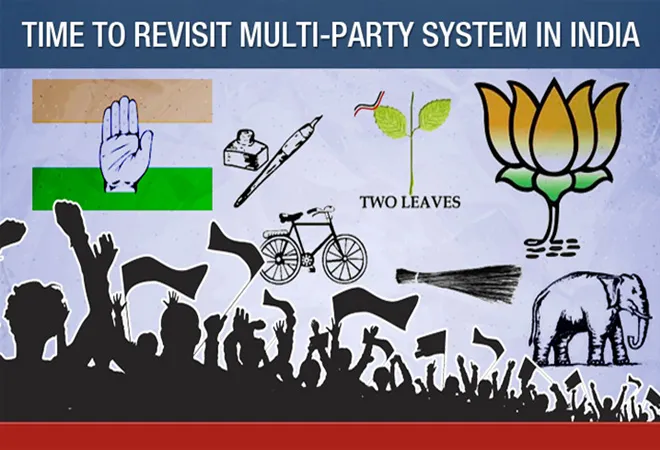
Developments since May 30 when Prime Minister Narendra Modi took oath of office for the second term after a massive victory of the BJP in the Lok Sabha elections have triggered a debate whether country was moving towards one-party polity away from the present multi-party system of democracy.
The Modi Government is going ahead with gusto and speed in the state of Jammu and Kashmir without taking anyone into confidence not even its own allies. It all began with sending of additional troops and contingents of para-military forces to the state. While non-BJP political opposition is in dark about happenings in the sensitive state, even ruling party’s allies in the NDA have no clue.
Popular Annual Amarnath Yatra has been cancelled without giving a reason or an explanation. Without making proper arrangements to comply with the Government’s advisory for their return, pilgrims have been asked to leave ending their journey to the holy cave halfway. Even tourists have been ordered to return curtailing their vacations of trip to the state. A second smaller pilgrimage, the Machail Mata Yatra, in Jammu was also cancelled. Schools and educational institutions have been ordered to close and hostels have been asked to be vacated.
Advisory to their citizens from foreign governments for not travelling to J& K has further added to the prevailing confusion. In the absence of credible information from official quarters, speculations and rumours are ruling the roost resulting in long queues before petrol stations, food stores and ATMs. What is adding to prevailing confusion is the fact that never before in the history of the state such an advisory to return cancelling their visit to the state by the central government was issued. Anticipating the worst, people are in fear of the unknown.
Legislations are being rushed through parliament without much debate or scrutiny. Because of its overwhelming majority in the Lok Sabha, bill and legislations have been passed there without any hurdle. Lack of majority in the Rajya Sabha is no hurdle for the Government because it has broken ranks of the opposition through clever floor management by using carrot and stick approach.
The regional parties like the BJD, TRS, YSR Congress, AIADMK are cooperating with the Modi 2.0 government since they need central funds and assistance to execute their welfare programmes that are so crucial for remaining in power. Rest of the opposition leaders and parties are either under threat of a government agency acting against them or are busy protecting their ranks from being poached by the BJP.
In last couple of weeks, the coalition JD (S)-Congress government in Karnataka has been brought down and a BJP government stalled. Leaders of non-BJP parties are joining the ruling party in hoards. The BJP is weaning away MLAs through either rewarding them with lucrative posts or through action against them. Like in Goa where 10 of the Congress 15 MLAs, constituting two-thirds of the group, were managed so that they can merge in the BJP making the entire process legal.
In the upper house, where the ruling BJP-led NDA was to have a majority by November 2020, the BJP has succeeded in luring away MPs from the opposition ranks. First four MPs from the TDP joined the BJP followed by an INLD MP Ram Kumar Kashyap. In case of Congress MP Sanjay Singh, Surendra Nagar and Neeraj Shekhar of the Samajwadi Party, the BJP made them resign their membership to circumvent the provisions of the Anti-Defection Act as all the three would be reelected in the bye polls since in the Assam and UP, the BJP is in majority.
Successful passage of the two controversial Bills, for diluting the RTI Act and to criminalise triple talaq is an evidence of the determination and resolve of Modi-Shah duo to fulfill the Rashtriya Swyamsevak Sangh (RSS) ideological agenda of ‘Hinduatva’ either with fair means or finding ways to circumvent existing laws and provisions.
Through the Medical Commission Bill, the Modi government is taking away right of the sates to conduct MBBS entrance examination as medical education is on the concurrent list by seeking to replace them with common MBBS entrance and exit examinations. Such measures are a clear violation of the principle of federalism.
The Modi government has been taking steps to concentrate powers in the hands of the Union government in the name of fighting terrorism and international crime. The Centre, through these Acts like the Unlawful Activities Prevention Amendment Act, is likely to intervene in states’ law and order issues which strictly come under the state subject according to the Constitution.
After the defeat of the Congress in 1989 general elections, there was a general consensus among the political experts and observer of that era, that coalition politics has dawned and it is going to last long. It was considered well near impossible that a single party rule would ever be witnessed in the country.
The 2014 parliamentary election proved all experts wrong and 2019 Lok Sabha polls more than confirmed that coalition era was a temporary phase. People at large continue to yearn for a strong leader who brooks no resistance or opposition.
A careful and focused view of the steps taken by the Modi 2.0 government since it assumed charge reveals that there is indeed a serious challenge to the prevailing system.
If the opposition particularly the Congress continues to remain in disarray and fails to put their house in order by agreeing on a common agenda to protect the Constitution, the BJP’s march to create a nation of its choice seems to be unstoppable.
The views expressed above belong to the author(s). ORF research and analyses now available on Telegram! Click here to access our curated content — blogs, longforms and interviews.




 PREV
PREV


